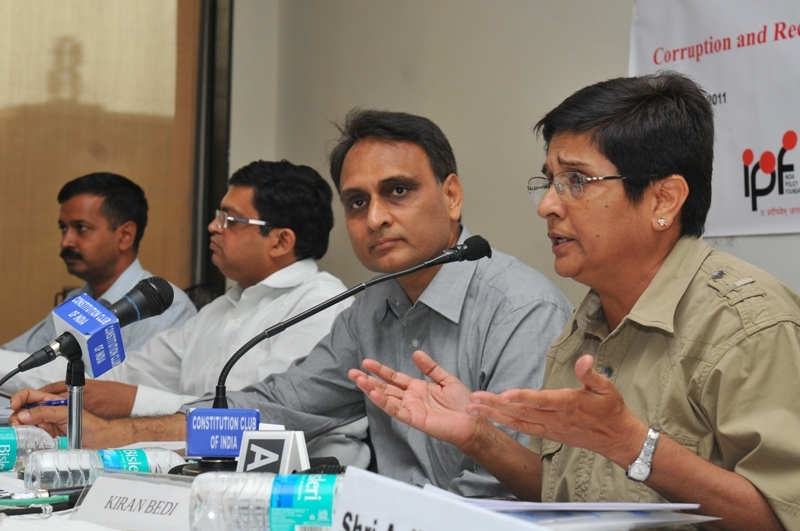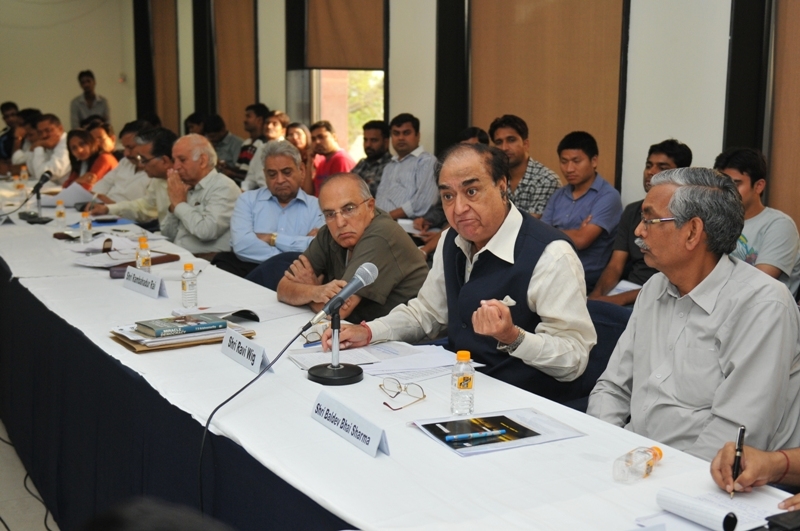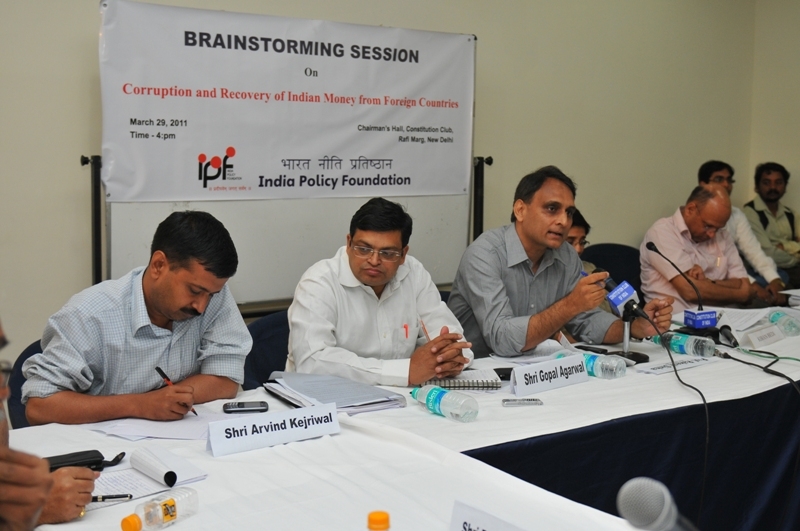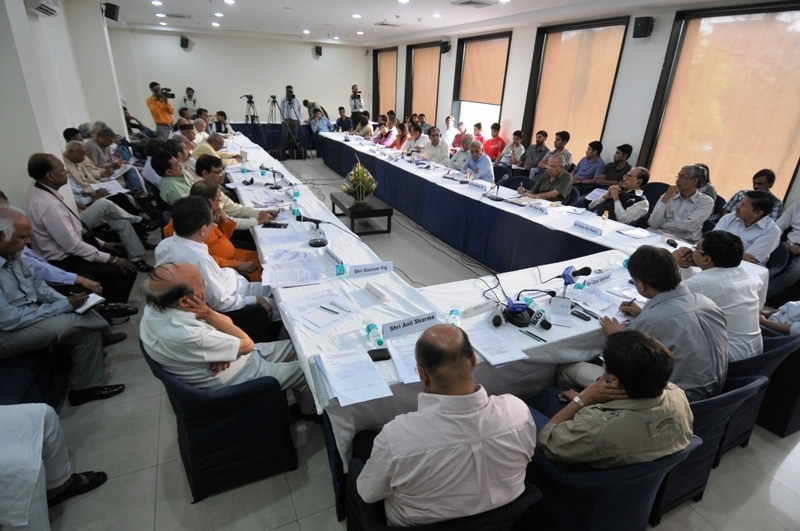Corruption and Recovery of Indians Illegal Deposits in Foreign Banks
Total Views |

March 29, 2011, Constitution Club, New Delhi
Session Chair: Prof. Rakesh Sinha
Panel Members:
Shri Arvind Kejriwal, RTI activist
Dr. Kiran Bedi, Former IPS Officer
Shri Sunil Bansal, ABVP Leader
Shri Ram Sharan Joshi, Veteran Journalist
Shri AN Mishra, Senior Journalist and Former VC
Justice DS Tiwatia
Shri Baldev Bhai Sharma, Chief Editor, Panchajanya
Shri Rajesh Gogna, Human Rights Activist
Prof IM Kapahy, University Teachers’ Leader
Shri Brij Kishore Sharma, Constitutional Expert
Prof Rakesh Sinha, Hon. Director of the Foundation, in his initial remark said that the present revelation of corruption cases reflects severe socio-political crisis imposed on our nation by a microscopic minority of political elite. He characterised it as “playing havoc with the idea of India”. He said Parliament is presiding over a decline of moral values. The parliamentary debate is now like a school debate in which speakers (for and against) try to score points. There is very little hope to get this critical issue resolved through such debates. How much the index of moral values has come down is obvious from an example, he said. In Madras a peon of a government hospital was found guilty of taking one rupee as bribe from a patient. He was awarded six months imprisonment. Now A Raja from the same State is enjoying the patronage of the political establishment despite his role in a scam which caused the loss of 1,76,000 crore rupees!

He said that Parliament is a tool of democracy and there is a danger of delegitimisation of this tool if people’s faith is not restored and the way to do it is mass movement. A position paper, drafted by Sh. Gopal Agarwal, was presented at the session for debate. In his research paper, he said that the people want solution and there is a need for firm legislation to curb corruption at the highest level. There is urgency to adopt a Jan Lokpal Bill, provisions in the law to recover the money generated through bribery and also legislation to prevent private to private corruption. He urged the gathering to focus on the issue of how to recover the huge amount of money deposited in the Swiss and other foreign banks by Indians secretly. Agarwal also presented other draft documents on recommendations for recovery of illegal monies stashed in foreign banks and prevention of bribery in private sector Bill, for discussion.
Ms Kiran Bedi, making her intervention, said that time has come for the people to join in for a mass movement to overthrow the corrupt regime. She appealed to the people to support Anna Hazare’s fast on April 5, 2011, stating that “our earnest duty is to save the nation from the greedy, corrupt people”. She said that the people should and be prepared to march in the street and demonstrate their strength.

Sh. AN Mishra, former VC and veteran journalist, traced the history of corruption and anti-corruption movements in the country. He feels another JP movement is imminent at this juncture. Sh. Sunil Bansal, joint organising secretary of the ABVP, said that the ABVP is committed to fight out this evil from the body polity and a movement had already been launched. Students were responding very enthusiastically and thousands of them joined in the dharna organised by the ABVP all over the country against corruption in public life. Prof IM Kapahy, a veteran teacher who has been leading the National Democratic Teachers Front (NDTF) for decades, cited statistical data to prove that the amount of money deposited in the Swiss bank alone can save 20 lakh families from poverty - which is far more than our annual budgetary expenditure on health and education.
Sh. Baldev Bhai Sharma, Editor, Panchajanya, raised a pertinent question, “Why has corruption become a cyclical phenomenon?” Sharma argued that while the immediate need of the hour was an anti-corruption movement to punish the corrupt and recover the wealth illegally amassed by a few powerful people, there is another dimension to it. We have to think why people give and take and bribe. We need to contemplate on a long-term solution to the problem, i.e., lok prishkar. He emphasised that character-building is the only solution to the problem. He lamented that when the chapters on great heroes like Shivaji and Maharanapratap have been removed from the CBSE syllabus, how can we expect our children to inculcate great qualities?

Sh. Rajesh Gogna, a well-known lawyer and human rights activist, said that although he supported Arvind Kejriwal, Kiran Bedi and others in their efforts, somehow he was not convinced that such efforts can lead to a genuine change. Brij Kishore Sharma, an eminent constitutional expert, emphasised the need to amend the existing laws to prevent cases of corruption. He felt that the present company law is insufficient to prevent corruption at the corporate level. Jagniwas Iyer, an intellectual, observed that politics is polluted and collective effort is needed to achieve a desired goal.
Priya Dabas, vice-president of the Delhi University Students Union (DUSU), felt the need for all-out transformation to make change at the political and civil society levels. According to her, society has been plagued by the menace of corruption and she gave an example of how drivers and traffic police both are found giving and taking bribery. It is a march of corruption towards the higher places in the structure of the State. She assured the audience that university students will join all anti-corruption movements.
Justice DS Twitia argued that judicial intervention need to be supported by organised civil society. Sh. Anil Sharma, a chartered accountant who has co-authored the Bill on prevention of bribery in private sector , explained the urgency to have a law to curb private-to-private bribery. He argued that without such legislation we cannot curb corruption since the private sector constitutes a major part of our economy.
Ravi Wig, representing the industry sector, said corruption has become an incentive for getting work done. Complimenting Baldev Sharma, he stated that there is a need for long-term solution to the problem. Corruption should be looked at with contempt. Arvind Kejriwal, RTI activist, clarified that he and other organisers of the anti-corruption movement did not claim to change the system or the polity. They are just demanding a Jan Lokpal Bill whose purpose is to bring the people at the top under the purview of anti-corruption laws. He claimed that the Bill would be the only purposeful legislation in the history of modern India. He asked the people to support the demand for its legislation. He also supported the need for a legislation on private sector bribery.
Promod Chawla, a social activist, suggested that the people should use the RTI provisions as much as they can in order to check redtapism and corruption. Sandhya Jain, a veteran columnist and chief editor of www.Vijayvani.com, argued that corruption must be ruthlessly curbed and a non-party movement is one way of achieving it.